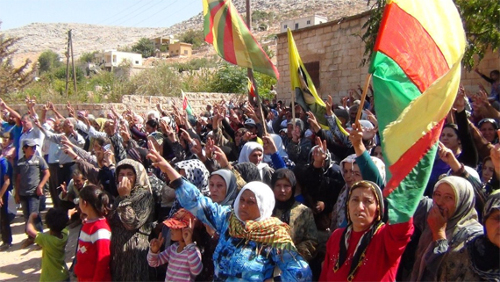By Dr. Jan Best de Vries:
At the end of the year 2015 it is useful to reflect upon the new society which the Kurds and minority groups like the Assyrians, Armenians, Jews, Arabs, Tschetchens and Aramaeans together have created in Rojava, the overwhelmingly Kurdish region in North Syria stretching along the border with terrorist Turkey nearly to the Mediterranean. Representatives in the military, administrative and political sectors are directly chosen by the people from bottom to top, there is no distinction made between members of the different ethnic groups who hold the established functions of a dual nature — for each function is held by a woman and a man — because since the revolution in October 2012 gender equality reigns in Rojava. The army is purely a people’s army, consisting of the YPG (People’s Defense Units) and YPJ (Women’s Defense Units). Moreover there is in this new society with its Social Contract for everyone a strict division of public domain and religion so that you may find both Christian Assyrians and Sunnite Kurds serving in the YPG, in which you may also find professional American, Australian, Canadian and Dutch soldiers (the so-called Lions), and in YPJ uniform Swedish and Polish girls are patrolling the mountainous area of Rojava behind the front with Islamic State. In all ways of life, architectural and agricultural projects, schools and academies, many Westerners support the inhabitans of Rojava in building up their autonomous region. However, all of them are volunteering individuals, because both Western and Eastern governments look away from this truly democratic experiment in Rojava: they are just afraid of a real democracy in their own countries.
Since the United Nations have unanimously decided in December 2015 to strive after a political solution of the civil war in Syria, the American and Russian governments will undoubtedly take the lead. Now Syria as a state is an artificial construction by the French government, which in 1919 created it as a French mandate out of the former, reduced Ottoman Vilayets of Syria and of Aleppo for reason of the presence of oil. When Syria became independent from France in 1946, the borders of this former French mandate were not changed. If there should be any peaceful solution for the civil war in Syria, it should return to two autonomous provinces with as their respective capitals Aleppo and Damascus. The northern province would be orientated towards the West, that is the USA and Europe, the southern province towards Russia and Iran. Any other political solution will mean the end of the democratic system now developing within Rojava. But then the multi-ethnic and multi-religious inhabitants of Rojava with their gender equality have for the first time in history shown to the world that there is a peaceful alternative for human beings to live in it and that for mankind as such there is at least some hope for the future…. Rojava writes History!
Dr. Jan Best de Vries is an archaeologist and historian, decipherer of the so-called Byblos Script from Aleppo and Alalakh (‘How to Decipher the Byblos Script’, Aspekt Publishers 2014, ISBN978-946-153-420-0)
.jpg)




Rojava is the site of the most constructive and optimistic project in the entire Middle East.
I wish we had something similar in the UK, but global corporations, supported by Brussels as well as our own government, have too much of a stranglehold.
I’m sorrier than I can say that our dishonourable leaders have failed to ensure a place at the peace talks for the Kurds, who are setting an example of democratic secularism for the region. They are living proof that Muslims need not be trapped in the ideology of theocratic imperialism.